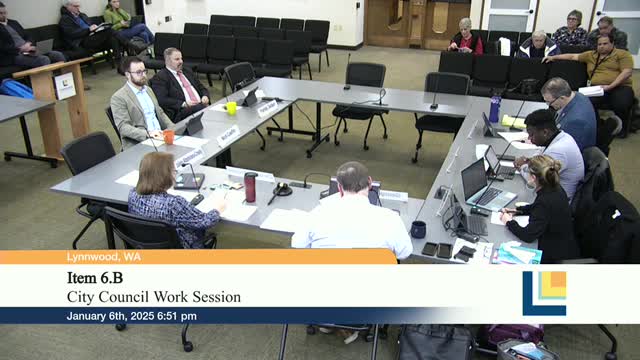Council briefed on state-required STEP housing code amendment tied to comp plan certification; council raises equity and neighborhood concerns
Get AI-powered insights, summaries, and transcripts
Subscribe
Summary
Planning staff briefed council on a draft STEP housing code amendment required for comprehensive plan certification; the draft would expand permitted housing types and create a STEP permit to track deployments.
Planning staff told the Lynnwood City Council that a draft code amendment is required by state law (referencing HB 1220 and Department of Commerce guidance) to permit STEP housing types in zones where residential uses or hotels are permitted. The staff presentation defined the four STEP categories as: indoor emergency shelters, transitional housing (generally up to two years with supportive services), indoor emergency housing (limited duration stays), and permanent supportive housing (no length limit).
Staff said Department of Commerce clarified that the city must adopt this local code in order for the updated comprehensive plan to be certified. The draft ordinance would permit permanent supportive and transitional housing in single-family, multifamily and public/semi-public zones; other STEP types would be allowed where hotels are permitted (commercial and mixed‑use zones). Staff proposed a STEP housing permit (administrative decision with appeal to the hearing examiner) and a starting permit fee of $640, the city’s lowest planning permit fee, to help track and report STEP housing activity for the state-required five‑year housing report.
Council members pressed staff for more precise definitions and examples. Questions included whether historically called “halfway houses” or recovery residences fall under the transitional housing definition, whether behavioral health or substance‑use facilities are included, and how the change would affect South Lynnwood, an area flagged in staff’s racially disparate impacts analysis as vulnerable to zoning and environmental justice pressures. Staff committed to provide Department of Commerce clarification in writing before the public hearing and to include examples of comparable local facilities (for instance, Housing Hope’s Scriber Place as similar to permanent supportive housing).
Staff also noted the STEP amendment was modeled on existing code structures (similar to adult family home permits) to limit conditional‑use barriers that could delay providers. The Planning Commission held a public hearing in December and recommended the draft ordinance; staff scheduled a council public hearing next week and said it anticipates adoption of the ordinance concurrent with the comprehensive plan vote on Jan. 27, 2025. Council did not vote on the ordinance at the work session but asked for additional clarifying information prior to the public hearing.
